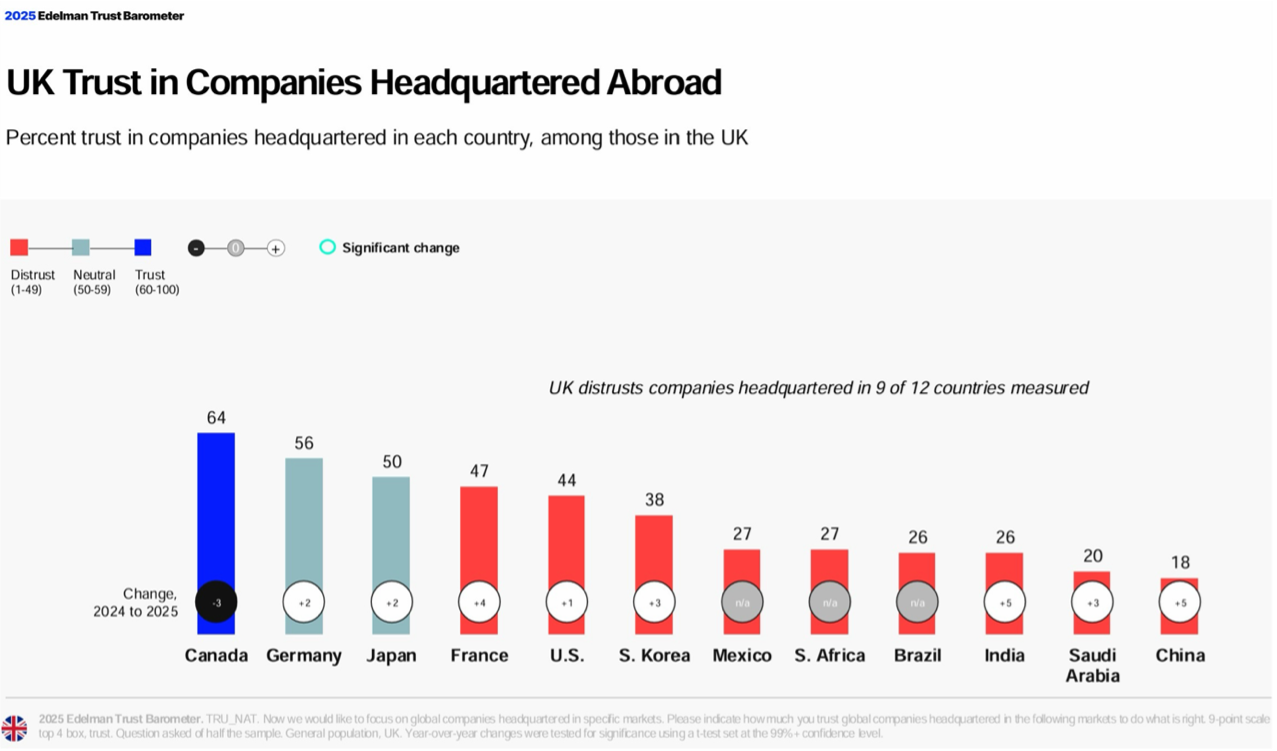
Trust in UK institutions is eroding. The 2024 Ipsos Veracity Index reveals only 36% of the public trust business leaders to tell the truth. The 2025 Edelman Trust Barometer echoes this: 56% believe CEOs purposely mislead the public.

Among the four major UK institutions, business is the most trusted - but only just - with a “neutral” score of 53%. NGOs, government, and media all fall into distrust territory.
For British manufacturers, especially those proudly using the Made in Britain trademark, this is more than a reputational issue - it’s a strategic risk. Yet in a low-trust world, businesses that earn trust gain a rare competitive advantage.
The trust deficit
The UK public is increasingly sceptical. While the Made in Britain trademark still evokes quality and reliability, these values must now be proven through action.
Distrust shows up in:
- Doubts about sustainability claims (greenwashing fatigue)
- Cynicism toward pricing, sourcing, and labour ethics
- Rising demand for ethical, local, and transparent businesses
Why trust matters more than ever
Trust is not a soft value - it drives real performance:
- Customer loyalty: 71% won’t buy from companies they don’t trust (source: PwC)
- Talent attraction: Gen Z prefers transparent, purpose-led employers
- Resilience: Trusted businesses bounce back faster from crises
- Collaboration: In B2B, trust enables faster, deeper partnerships
Trust is foundational to your social licence to operate - the informal permission from customers, employees, communities, and regulators to do business.
What’s driving distrust?
- Transparency gaps: Stakeholders want clear, honest insight into operations, sourcing, and trade-offs.
- Perceived injustice: Unfairness in pay, opportunity, or impact damages trust.
- Digital misinformation: People are more sceptical and demand authenticity and evidence.
- Cultural disconnection: Generic messaging misses the mark - local relevance builds real connection.
What Made in Britain manufacturers can do
British manufacturers are uniquely positioned to lead a trust renaissance. Here's how:
- Make transparency a daily practice
Share sourcing, pricing, and sustainability efforts openly. Use packaging and websites to explain your processes and trade-offs honestly. - Localise your impact
Go beyond the Made in Britain trademark - support local schools, charities, and communities. Highlight your role in creating jobs, skills, and regional resilience. - Empower employees as trust ambassadors
Train staff in ethical communication. Showcase employee voices and build a culture of openness. - Lead on ethics and inclusion
Proactively audit your supply chain and hiring practices. Share your progress - warts and all. - Measure and monitor trust
Use surveys, feedback, and tools like the Edelman Trust Barometer to track trust levels and act on insights.
Trust as a regenerative asset
In the next decade, trust will become a regenerative business asset, helping companies:
- Build customer loyalty
- Strengthen supplier relationships
- Withstand shocks
- Lead the shift toward a fairer, greener economy
For British manufacturers, trust is not just a moral imperative - it’s a strategic one. The Made in Britain trademark is a promise. In today’s low-trust environment, the businesses that live up to that promise - openly, consistently, and humbly - will be the ones that thrive.
Want to learn more?
Download Chris's free book: Trust and Transparency: The Foundations of a Social License to Operate.
Professor Chris Harrop OBE is visiting professor in sustainable business at the University of Huddersfield Business School.
By Made in Britain 3 months ago | By Made in Britain